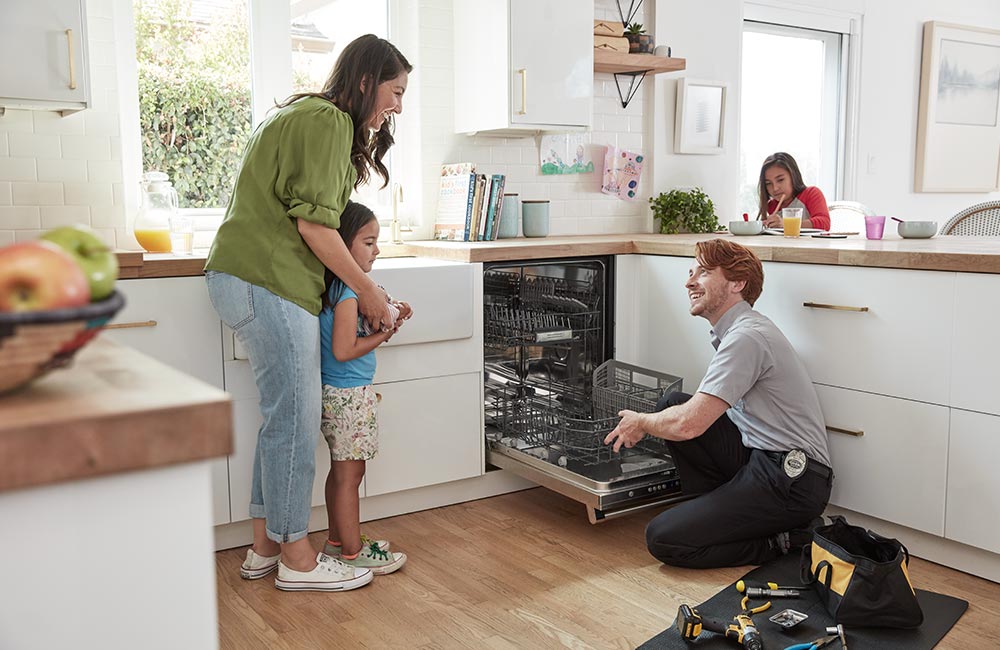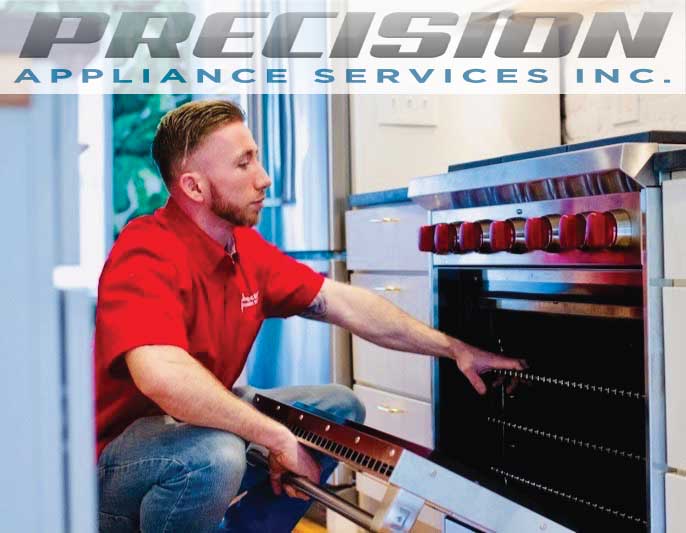Essential Safety Rules for DIY Repairs – Dependable Refrigeration & Appliance Repair Service Dryer repair near me
Essential Safety Rules for DIY Repairs – Dependable Refrigeration & Appliance Repair Service Dryer repair near me
Blog Article
The Ultimate Overview to Understanding Device Fixing in the house
When your refrigerator quits cooling or your oven rejects to heat, it can really feel frustrating. Recognizing device repair work in the house can save you money and time. You'll discover to acknowledge signs and symptoms, utilize important devices, and adhere to an organized troubleshooting procedure. Yet before you begin, there are essential security preventative measures you require to consider. What are the most usual problems, and just how can you fix them? Allow's explore the essentials.
Usual Appliance Problems and Their Signs
When your home appliances start acting up, it's important to recognize the indications beforehand. Overlooking them can bring about larger concerns and pricey repair work. If your refrigerator isn't cooling properly, you may observe warm places or condensation forming. This might indicate a falling short compressor or an obstructed vent.Your dishwashing machine may reveal issues through unclean dishes or unusual noises during cycles. If you hear grinding or clanking, it's time to investigate.A cleaning device that will not spin or drain pipes can leave you with soggy laundry, recommending a clogged drainpipe or a malfunctioning pump.Lastly, if your oven's temperature appears off or it takes permanently to pre-heat, you could be dealing with a defective thermostat. By staying sharp to these signs, you can address problems prior to they rise right into major repair work.
Crucial Tools for Device Fixing
When you're dealing with home appliance repair services in the house, having the right tools is essential. Basic hand devices like screwdrivers and pliers will assist you dismantle and repair numerous appliances, while electric testing gadgets ensure you're functioning safely with electrical wiring. Let's look at what you require to start on your fixing journey.
Basic Hand Tools
Having the right devices is necessary for efficient device repair work in the house. Start with a dependable screwdriver collection, including both flathead and Phillips types, as screws are usual in appliance assembly. Pliers are additionally essential; they assist with gripping, twisting, and reducing cords or tiny elements. A pair of needle-nose pliers can get to limited spots quickly. You'll need an excellent adjustable wrench for tightening or loosening up nuts and bolts. An utility knife is helpful for cutting via product packaging or insulation. Ultimately, don't neglect a strong workbench or surface to securely arrange your devices and parts. With these standard hand devices, you'll be well-prepared to tackle most appliance fixings that come your means.
Electric Screening Gadgets
Alongside standard hand tools, electric screening devices play an essential role in appliance repair. These tools help you diagnose electric issues and guarantee devices work securely. A multimeter is essential; it gauges voltage, current, and resistance, allowing you to pinpoint problems promptly. A non-contact voltage tester is one more essential, allowing you find live cables without making direct contact, boosting your security. Clamp meters are great for determining existing flow in cables without disconnecting them, saving you effort and time. Additionally, circuit testers can quickly check if outlets are operating appropriately. By utilizing these tools, you'll enhance your troubleshooting process and improve your repair abilities, making device maintenance a whole lot easier.
Step-by-Step Guide to Diagnosing Appliance Issues
When your device acts up, it can be aggravating, however diagnosing the issue doesn't have to be overwhelming. You'll learn to determine usual problems and use reliable repairing strategies. Let's walk through the steps to get your appliance back in functioning order.
Common Device Problems

Troubleshooting Techniques Discussed

Fixing Major Kitchen Area Devices: A Closer Look
Have you ever before asked yourself just how to take on usual issues with your kitchen area home appliances? Repairing major kitchen area appliances like refrigerators, ovens, and dishwashers can be simpler than you think. Begin by determining the trouble-- whether it's a refrigerator not cooling or an oven that will not heat. Usually, a straightforward reset or inspecting the source of power can resolve the issue.For refrigerators, tidy the condenser coils and examine the door seals. If your oven's not heating, check the burner and thermostat. Dishwashing machines might just need a tidy filter or a reset to obtain them back in activity. Always disconnect the home appliance prior to diving into repairs to assure your safety.Don' t neglect to seek advice from the customer guidebook for particular fixing ideas related to your model. With a little bit of patience and the right tools, you can confidently deal with appliance fixings and save money while doing so!

Fixing Washing Equipments: Tips and Techniques
When your washing home appliances start breaking down, it can really feel frustrating, but troubleshooting them does not need to be a headache. Start by inspecting the power supply. Confirm the appliance is plugged in and the outlet is functioning. Next, inspect the door or cover button; a malfunctioning button can avoid the device from operating.For washers, if it's not spinning, look for out of balance loads. Rearranging the clothes might resolve the issue. If your clothes dryer isn't home heating, clean the dust filter and examine the vent for blockages.Listen for uncommon noises; they can suggest a problem. If your home appliance is dripping, examine the hoses for fractures or loosened connections. Record any mistake codes presented on electronic screens, as they can guide you in determining the problem. Get in touch with the user guidebook for details fixing suggestions related to your design.
Safety And Security Precautions to Take During Repair works
Before you start any home appliance repairs, it's important to prioritize security to stop accidents or injuries. Disconnect the appliance or transform off the circuit breaker to guarantee no power reaches it while you work. Usage shielded tools to reduce the threat of electrical shock. Wear security goggles and handwear covers to shield yourself from sharp sides or debris (Dependable Refrigeration & Appliance Repair Service Washing Machine Repair).Make certain your workspace is clean and well-lit, so you can see what you're doing. Maintain children and pet dogs far from the area to prevent diversions and potential risks. If you're handling gas devices, be added mindful; check for leaks before proceeding.Take your time, and don't hurry with repair work. If you feel uncertain concerning any kind of step, it's better to stop briefly and study than to guess. Following these safety measures will aid create a much safer environment for your DIY appliance repair service job
When to Call a Professional for Aid
How do you recognize if it's time to contact a professional for device fixings? If you have actually attempted standard troubleshooting without success, it's a clear sign. As an example, if your device still won't begin or reveals uncommon sounds after resetting it, do not wait to seek professional help.When you see leaks, smoke, or melting smells, focus on safety and call a pro immediately. These concerns can cause more considerable damages or position dangers to your home.Also, if your device is under warranty, speaking to a specialist is usually the very best route. They can guarantee that repair work will not invalidate your service warranty, saving you money in the long run.Finally, if you're unsure or uneasy with complicated fixings, it's important to leave it to the experts. Bear in mind, dealing with complicated issues without the best expertise can lead to expensive mistakes. Count on a professional when unsure!
Frequently Asked Questions
How Can I Prevent Appliance Problems in the Future?
To avoid device problems in the future, you need to execute normal upkeep, look for deterioration, click here tidy filters, and stay clear of overloading. Remaining positive will help prolong their life-span and maintain them running smoothly.
What Are one of the most Usual DIY Device Repair Mistakes?
You may neglect safety and security preventative measures, skip repairing actions, or make use of inaccurate devices when trying DIY appliance fixings. Hurrying the process or overlooking maker standards can result in even more considerable problems and expensive errors. Remain person and notified!
Exactly how Do I Know if a Part Requirements Substitute?
You can inform if a component needs substitute by looking for unusual sounds, leakages, or irregular performance. If the home appliance struggles to operate appropriately or shows noticeable damage, it's likely time for a replacement.
Can I Use Generic Parts for Appliance Services?
Yes, you can use generic components for home appliance fixings, however identify they work - Washer dryer repair service Dependable Refrigeration. Common components might conserve you money, but they could influence performance or durability, so consider your alternatives thoroughly prior to deciding
What Warranties Cover Device Repairs?
Most home appliance guarantees cover repair work for producing defects, however they usually leave out damage from misuse. Inspect your warranty terms carefully, as some might need utilizing certified professionals and initial parts for insurance coverage to remain legitimate.
Report this page